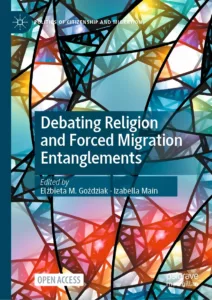 What role does religion play in responding to forced migration crises around the world?
What role does religion play in responding to forced migration crises around the world?
As part of a new book published by Palgrave Publishing USCCB/MRS staff, Todd Scribner, has co-authored a chapter titled Religion Resettles Refugees: Religion’s Role in Integration in the United States, which examines an ongoing initiative, the Religion and Resettlement Project, which takes as its central premise the idea that religion is a critical aspect for understanding refugees’ mental health and civic lives, fostering civil society, conceptualizing the long-term displacement of refugees, and assisting with their integration.
This new book, Debating Religion and Forced Migration Entanglements, brings into dialogue emerging and seasoned migration and religion scholars with spiritual leaders and representatives of faith-based organizations assisting refugees. Violent conflicts, social unrest, and other humanitarian crises around the world have led to growing numbers of people seeking refuge both in the North and in the South. Migrating and seeking refuge have always been part and parcel of spiritual development. The current ‘refugee crisis’ in Europe and elsewhere in the world has brought to the fore fervent discussions regarding the role of religion in defining difference, linking the ‘refugee crisis’ with Islam, and fear of the ‘Other.’ Many religious institutions, spiritual leaders, and politicians invoke religious values and call for strict border controls to resolve the ‘refugee crisis.’ However, equally many humanitarian organizations and refugee advocates use religious values to inform their call to action to welcome refugees and migrants, provide them with assistance, and facilitate integration processes.
